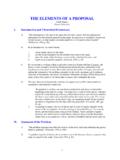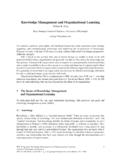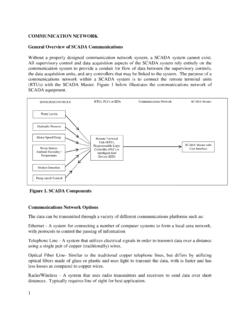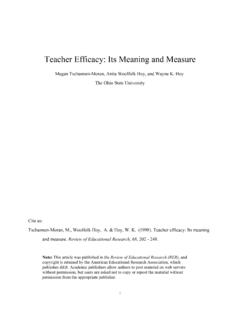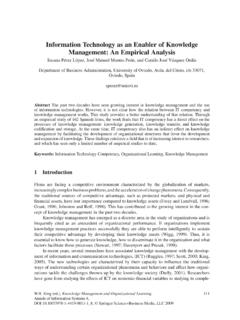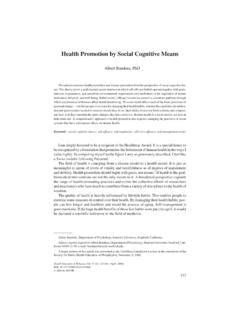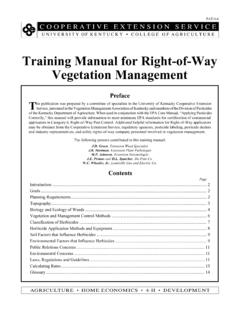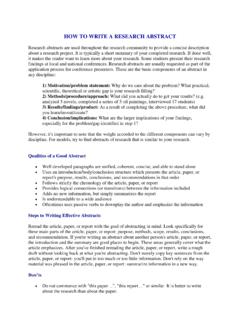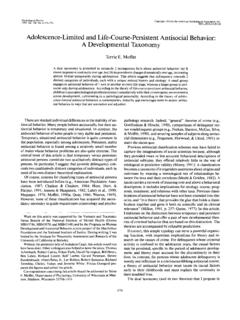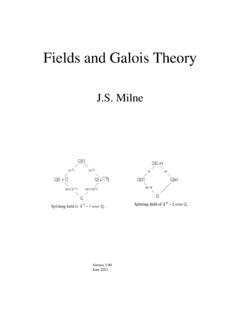Transcription of SOCIAL COGNITIVE THEORY: An Agentic Perspective
1 Annu. Rev. Psychol. :1-26 Copyright @ 2001 by Annual Reviews. All rights reservedSOCIAL COGNITIVE THEORY: An AgenticPerspectiveAlbert BanduraDepartment of Psychology, Stanford University, Stanford. California 94305-2131;e-mail: Words biosocial coevolution, collective efficacy, emergent properties, humanagency, self-efficacy Abstract The capacity to exercise control over the nature and quality of one's life isthe essence of humanness. Human agency is characterized by a number of core featuresthat operate through phenomenal and functional consciousness. These include thetemporal extension of agency through intentionality and forethought, self-regulation byself-reactive influence, and self-reflectiveness about one's capabilities, quality offunctioning, and the meaning and purpose of one's life pursuits.
2 Personal agencyoperates within a broad network of sociostructural influences. In these agentictransactions, people are producers as well as products of SOCIAL systems. SOCIAL cogni-tive theory distinguishes among three modes of agency: direct personal agency, proxyagency that relies on others to act on one's behest to secure desired outcomes, andcollective agency exercised through socially coordinative and interdependent transnational embeddedness and interdependence are placing a premium oncollective efficacy to exercise control over personal destinies and national life. SHIFTS IN PSYCHOLOGICAL THEORY OF HUMAN FEATURES OF HUMAN MANAGEMENT OF OF HUMAN OF COLLECTIVE EFFICACY IN CHANGING PRIMACY OF HUMAN AGENCY IN BIOSOCIAL $ 12 BANDURAINTRODUCTIONTo be an agent is to intentionally make things happen by one's actions.
3 Agency embodiesthe endowments, belief systems, self-regulatory capabilities and distributed structures andfunctions through which personal influence is exercised, rather than residing as a discreteentity in a particular place. The core features of agency enable people to playa part in theirself-development, adaptation, and self-renewal with changing times. Before presenting theagentic Perspective of SOCIAL COGNITIVE theory, the paradigm shifts that the field ofpsychology has undergone in its short history warrant a brief discussion. In these theoreticaltransformations, the core metaphors have changed but for the most part, the theories granthumans little, if any, Agentic SHIFTS IN PSYCHOLOGICAL THEORIZINGMuch of the early psychological theorizing was founded on behavioristic principles thatembraced an input-output model linked by an internal conduit that makes behavior possiblebut exerts no influence of its own on behavior.
4 In this view, human behavior was shapedand controlled automatically and mechanically by environmental stimuli. This line oftheorizing was eventually put out of vogue by the advent of the computer, which likened themind to a biological calculator. This model filled the internal conduit with a lot ofrepresentational and computational operations created by smart and inventive thinkers. If computers can perform COGNITIVE operations that solve problems, regulativethought could no longer be denied to humans. The input-output model was supplanted byan input-linear throughput-output model. The mind as digital computer became theconceptual model for the times.
5 Although the mindless organism became a more cognitiveone, it was still devoid of consciousness and Agentic capabilities. For decades, the reigningcomputer metaphor of human functioning was a linear computational system in whichinformation is fed through a central processor that cranks out solutions according topreordained rules. The architecture of the linear computer at the time dictated the conceptualmodel of human functioning. The linear model was, in turn, supplanted by more dynamically organized computationalmodels that perform multiple operations simultaneously and interactively to mimic betterhow the human brain works.
6 In this model, environmental input activates a multifaceteddynamic throughput that produces the output. These dynamic models include multilevelneural networks with intentional functions lodged in a subpersonal executive networkoperating without any consciousness via lower subsystems. Sensory organs deliver upinformation to a neural network acting as the mental machinery that does the construing,planning, motivating, and regulating nonconsciously. Harre (1983) notes in his analysis ofcomputationalism that it is not people but their componentized subpersonal parts that areorchestrating the courses of action. The personal level involves phenomenal consciousnessand the purposive use of information and self-regulative means to make desired Perspective 3 Consciousness is the very substance of mental life that not only makes life personallymanageable but worth living.
7 A functional consciousness involves purposive accessing anddeliberative processing of information for selecting, constructing, regulating, and evaluatingcourses of action. This is achieved through intentional mobilization and productive use ofsemantic and pragmatic representations of activities, goals, and other future events. In hisdiscerning book on experienced cognition, Carlson (1997) underscores the central role thatconsciousness plays in the COGNITIVE regulation of action and the flow of mental have been some attempts to reduce consciousness to an epiphenomenal by-productof activities at the subpersonal level, to an executive subsystem in the informationprocessing machinery, or to an attentional aspect of infonnation processing.
8 Like thelegendary ponderous elephant that goes unnoticed, in these subpersonal accounts ofconsciousness there is no experiencing person conceiving of ends and actingpurposefully to attain them. However, these reductive accounts remain conceptuallyproblematic because they omit prime features of humanness such as subjectivity,deliberative self-guidance, and reflective self-reactiveness. For reasons to be given shortly,consciousness cannot be reduced to a nonfunctional by-product of the output of a mentalprocess realized mechanically at nonconscious lower levels. Why would an epiphenomenalconsciousness that can do nothing evolve and endure as a reigning psychic environment inpeople's lives?
9 Without a phenomenal and functional consciousness people are essentiallyhigher-level automatons undergoing actions devoid of any subjectivity or conscious do such beings possess a meaningful phenomenal life or a continuing self-identityderived from how they live their life and reflect upon it. Green and Vervaeke (1996) observed that originally many connectionists andcomputationalists regarded their conceptual models as approximations of cognitiveactivities. More recently, however, some have become eliminative materialists, likeningcognitive factors to the phlogiston of yesteryear. In this view, people do not act on beliefs,goals, aspirations, and expectations.
10 Rather, activation of their network structure at asubpersonallevel makes them do things. In a critique of eliminativism, Greenwood (1992)notes that cognitions are contentful psychological factors whose meaning does not dependon the explanatory propositions in which they figure. Phlogiston neither had any evidentialbasis nor explanatory or predictive value. In contrast, COGNITIVE factors do quite well inpredicting human behavior and guiding effective interventions. To make their waysuccessfully through a complex world full of challenges and hazards, people have to makegood judgments about their capabilities, anticipate the probable effects of different eventsand courses of action, size up sociostructural opportunities and constraints, and regulatetheir behavior accordingly.

